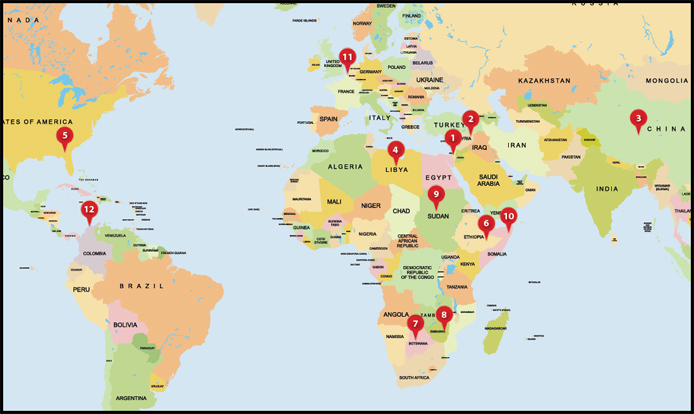South Africa – the global player
South Africa – the global player Estelle GreeffInternational relations
Map of the world indicating the countries with which South Africa has had negotiations regarding some key foreign-policy issues. South Africa's foreign policy entails promoting economic diplomacy, which will attract invest-ment and tourism, remove barriers to trade, support the development of larger markets in Africa and expand the markets for South African products.
Since 1994, the international community has looked on South Africa as a champion of human rights, democracy and reconciliation. The country has since managed to remain committed to its advocacy of democracy and, over the years, has played a meaningful role in the region, on the continent and internationally.
The year 2011 saw South Africa join two major international organisations; as a non-permanent member of the United Nations Security Council (UNSC) and as a member of the rising heavyweight club of Brazil, Russia, India and China – which together with South Africa form BRICS.
Through the country's involvement in international affairs, South Africa has had to establish a firm foreign policy approach. This was especially necessary in dealing with issues such as the building of Africa's newest state, South Sudan; helping famine-hit Somalia and assisting in the demand for real democratic reform in northern Africa and the Middle East.
South Africa believes in a democratic and open society, in which government is based on the will of the people and every citizen is equally protected by law.
Rapidly changing world
Some commentators have labelled South Africa’s foreign policy “spineless” forgetting that the foreign environment is a complex one, even more so for a young, developing country, which is facing the challenge of balancing its national interests against international realities in a rapidly changing world.
President Jacob Zuma recently clarified the country’s foreign policy, explaining South Africa’s position on various international issues.
South Africa believes in a democratic and open society, in which government is based on the will of the people and every citizen is equally protected by law, in addition to democratic values, social justice and fundamental human rights.
According to the President, the country’s foreign policy is based on four pillars:
- promoting the interests of the Southern African Development Community (SADC) and Africa
- promoting global equity and social justice
- recognising the significance of the developed North in forging ahead, while improving South-South cooperation
- strengthening and transforming the multilateral system.
South Africa’s foreign policy entails promoting economic diplomacy, which will attract investment and tourism, remove barriers to trade, support the development of larger markets in Africa and expand the markets for South African products.
This is linked to government’s commitment to eradicating inequality, unemployment and poverty.
So far, the results are encouraging. South Africa’s global exports have become more diverse over the last few years, increasing from R477 billion in 2007 to R584 billion in 2010.
Let’s look at South Africa’s foreign-policy position on a few key issues:
1 Palestine and Israel
South Africa supports the view that negotiations must be resumed to reach a lasting settlement to the Israeli-Palestinian conflict. This solution should fulfil the aspirations of both parties for independent homelands through two states for two peoples, namely the State of Israel and an independent, adjoining and viable State of Palestine, living in peace and security. This is according to international agreements and relevant United Nations (UN) resolutions.
The peace agreement should also guarantee the security of both states, and address the rights of the return of Palestinian refugees, as well as the status of Jerusalem.
2 Syria
This country is integral to a wider resolution to the Middle East conflict. Its stability is linked to that of its neighbours as any action by the international community on Syria, including action by the United Nations Security Council should take the regional implications into consideration.
To emphasise this, South Africa abstained from the vote in the UNSC draft resolution on Syria, which strongly condemned Syrian authorities for their violent crackdown against pro-democracy protesters.
South Africa has urged Syria, including the opposition, to initiate transparent and all-inclusive political processes with its people to address their fundamental political rights and freedoms.
3 China
Relations with China have been elevated from a “strategic partnership” to a “comprehensive strategic partnership ”which is the beginning of a new relationship between the two countries.
Government believes that this Asian giant, as China is often called, will play a meaningful role in contributing to the country’s domestic priorities.
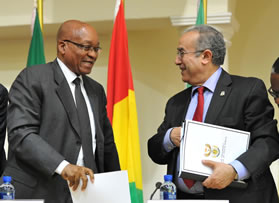 South Africa also supports Beijing’s One-China Policy, which rejects Tibet’s independence. It maintains that the One-China Policy is consistent with international law, which recognises the People’s Republic of China as the sole and legitimate representative of all the people of China.
South Africa also supports Beijing’s One-China Policy, which rejects Tibet’s independence. It maintains that the One-China Policy is consistent with international law, which recognises the People’s Republic of China as the sole and legitimate representative of all the people of China.
4 Libya
Following the death of Libyan leader, Muammar Gaddafi, South Africa has called for peace and reconciliation in that country.
A lasting and sustainable peaceful solution is possible through an all-inclusive political process. This will lead to the first-ever democratic elections in accordance with the Roadmap as announced by the National Transitional Council (NTC) of Libya.
Government is committed to work together with the African Union (AU), the UN, the League of Arab States and the Organisation of Islamic Conference to ensure coordinated support to the NTC and the Libyan people in general in their efforts to reconstruct their country and to bring about democratic, political and socio-economic changes.
Peace, stability and security are essential preconditions for development in Africa.
5 United Nations
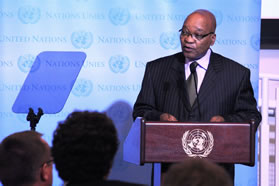 South Africa and like-minded countries such as India and Brazil feel that the developing world, especially Africa, has a limited voice and participation in the decision- and policy-making processes of the global trade, economic and financial institutions.
South Africa and like-minded countries such as India and Brazil feel that the developing world, especially Africa, has a limited voice and participation in the decision- and policy-making processes of the global trade, economic and financial institutions.
This, it maintains, weakens the world’s response to the developmental agenda of Africa and the South. Government says it will use its non-permanent member seat at the UNSC to advance Africa’s interests.
6 African Union
Government has pledged to intensify its engagements and structures in the AU in order for the AU to fulfil its role in building African unity and the social and economic development of the continent.
Further, it will continue to support regional and continental processes to respond to and resolve crises, strengthen regional integration, significantly increase intra-African trade, and champion sustainable development and opportunities in Africa.
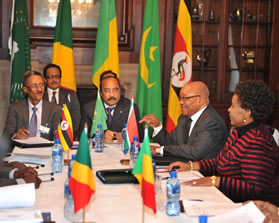 Peace, stability and security are essential preconditions for development in Africa. South Africa will work with the AU to discourage unconstitutional changes in governments.
Peace, stability and security are essential preconditions for development in Africa. South Africa will work with the AU to discourage unconstitutional changes in governments.
It will also continue to support AU and UN initiatives to find just and lasting solutions to outstanding issues of self-determination and decolonisation on the African continent.
7 Southern African Development Community
The integration of the SADC remains critical for the economic development of the region and for South Africa’s global competitiveness. Integration will offer an opportunity for regional industries to overcome the limits of small national markets, achieve economies of scale and enhance competitiveness.
South Africa also maintains that the region must be allowed to determine its own regional integration agenda and pace, without external interference.
The strengthening of the SADC is an essential requirement to ensure the economic viability of the region, as well as strengthening of regional economic programmes. These include the integration of the SADC, the Common Market for East and Southern Africa, the East African Community and the Southern African Customs Union, which will be an anchor in the SADC Free-Trade Area.
8 Zimbabwe, Madagascar and the Democratic Republic of Congo
As chair of the SADC troika, South Africa will do everything in its power to en-sure lasting peace and stability in these countries.
On Zimbabwe, South Africa has vowed to continue to call on the parties to create a conducive environment for credible, peaceful elections in accordance with the Global Political Agreement.
On Madagascar, South Africa says there is no alternative to the mediation effort and the Roadmap recently signed by the parties. It hopes to see democratic elections by the end of 2012.
9 Sudan and South Sudan
In line with the AU’s Post-Conflict Reconstruction and Development process, Africa will continue to support efforts aimed at ensuring peace and stability in South Sudan and its neighbourhood.
It will also assist in creating conditions for firmly establishing democracy and the development of government institutions in South Sudan. However, it has called on both sides to settle all the outstanding issues between them according to a specific time frame.
10 Somalia
Government supports a comprehensive approach that addresses both the economic and political challenges in Somalia, including the need to resolve the security and humanitarian situation in the country.
South Africa’s view is that counter-violence, aggression and acts of terror are counter-productive and will not deliver peace and security to the Horn of Africa.
11 European Union (EU)
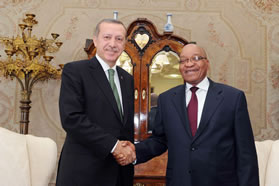 Notwithstanding Europe’s economic challenges, South Africa aims to continue to encourage its European partners to engage in the development of the African continent, meet their development assistance commitments, and push for the reform of the Common Agricultural Policy due to its detrimental effects on development in Africa.
Notwithstanding Europe’s economic challenges, South Africa aims to continue to encourage its European partners to engage in the development of the African continent, meet their development assistance commitments, and push for the reform of the Common Agricultural Policy due to its detrimental effects on development in Africa.
South Africa aims to work with the EU to open up market opportunities and attract increased foreign direct investment. It also aims to continue to cooperate and engage with European countries beyond the EU, such as Russia and Turkey, recognising their important role in regional support such as the AU’s peace and security initiatives and global politics in general.
12 Americas and the Caribbean
Bilateral relations with the countries of the Americas and the Caribbean serve as a firm foundation for advancing multilateral cooperation and promoting South Africa’s domestic priorities.
The United States of America (USA) continues to be an important trading and development partner of South Africa and Africa. The USA continues to influence global events and it is for this reason that South Africa engages the USA at various levels.
It will also expand bilateral relations with Latin America, Canada and the Caribbean, and continue to strengthen cooperation within the context of groupings of the South. In addition, South Africa will continue to develop relations with Cuba and to lobby for the lifting of the economic embargo.
